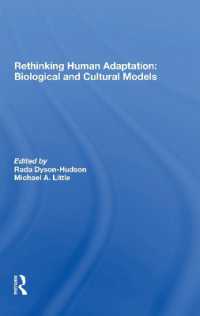- ホーム
- > 洋書
- > 英文書
- > Philosophy
Full Description
This book assesses and defends Kant's Critical epistemology, and the rich yet neglected resources it provides for understanding and resolving fundamental issues regarding human experience, perceptual judgment, empirical knowledge and cognitive sciences.
Kenneth Westphal first examines Kant's methods and strategies for examining human sensory-perceptual experience, and then examines Kant's central, proper, and subtle attention to judgment, and so to the humanly possible valid use of concepts and principles to judge particulars we confront. This provides a comprehensive account of Kant's anti-Cartesianism, the integrity of his three principles of causal judgment, and Kant's account of disciminatory perceptual-motor behaviour, including both sensory reafference and perceptual affordances. Westphal then defends the significance of Kant's subtle and illuminating account of causal judgment for three main philosophical domains: history and philosophy of science, theory of action and human freedom, and philosophy of mind.
Kant's Critical Epistemology will appeal to researchers and advanced students interested in Kant and the relations of his thought to contemporary philosophical debates and to the sciences of the mind.
Contents
Part I: Epistemological Context
1. Epistemology, Cognitive (In)Capacities and Thought Experiments
2. Kant, Wittgenstein, and Transcendental Chaos
3. Kant's Critique of Pure Reason and Analytic Philosophy
Part II: Kant's Critical Epistemology
4. Constructing Kant's Critique of Pure Reason
5. Consciousness and its Transcendental Conditions: Kant's Anti-Cartesian Revolt
6. Kant's Analytic of Principles
7. Kant's Dynamical Principles: The Analogies of Experience
8. How Does Kant Prove that We Perceive, and Not Merely Imagine, Physical Objects?
9. Kant, Causal Judgment, and Locating the Purloined Letter
Part III: Further Ramifications
10. Kant's Cognitive Semantics, Newton's Rule Four of Natural Philosophy, and Scientific Realism Today
11. How Kant Justifies Freedom of Agency (without Transcendental Idealism)
12. Kant's Two Models of Human Action
13. Mind, Language, and Behaviour: Kant's Critical Cautions Contra Contemporary Internalism and Causal Naturalism








